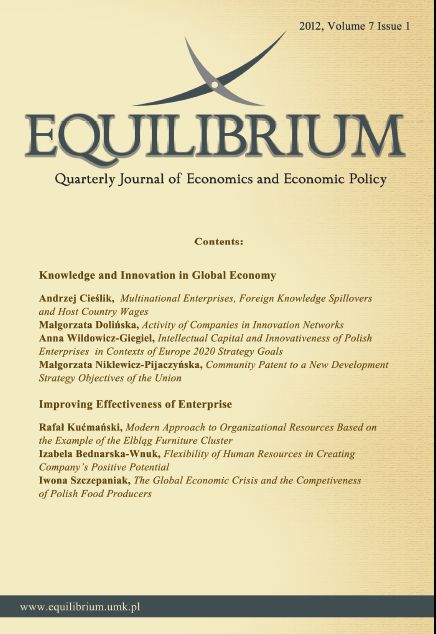Intellectual Capital And Innovativness Of Polish Enterprises In The Context Of Europe 2020 Strategy Goals
DOI:
https://doi.org/10.12775/EQUIL.2012.003Keywords
intellectual capital, enterprise innovativeness, perspectives of Polish economy developmentAbstract
From the majority of European Union documents it explicitly follows that innovations are a key to the economic future of Europe. Innovativeness, understood as a propensity to create new or modernize the existing solutions, and the ability to absorb foreign scientific or technological achievements, is extremely important for the Polish economy. Unfortunately, both innovation activity of enterprises and the results obtained in this field by the Polish economy have not been satisfactory so far. The main purpose of this study is to present the issue of innovation in Polish enterprises, significantly influenced by intellectual capital. It is commonly known that all intangible assets possessed by a society, i.e. all the components of intellectual capital, including human, structural and social assets, currently play an important role in the process of creating innovation. The analysis of the relation between the innovativeness of economic entities and the quality of Poland’s intellectual capital was done in the light of the basic assumptions of the renewed Lisbon Strategy and the Europe 2020 Strategy.References
Baczko T. (2009), Raport o innowacyjności gospodarki Polski w 2009 roku – Synteza wyników badań, INE PAN, Warszawa.
Czy warto inwestować w innowacje? Analiza sektora badawczo-rozwojowego w Polsce (2009), Raport KPMG.
Diagnoza stanu szkolnictwa wyższego w Polsce (2009), Ernst&Young oraz Instytut Badań nad Gospodarką Rynkową, Warszawa.
Działalność innowacyjna przedsiębiorstw w latach 2006-2009 (2010), GUS, Warszawa.
Europe in Figures (2010), Eurostat Yearbook, Luxemburg.
European Innovation Scoreboard (EIS) 2009 (2010), European Commission.
Europa 2020. Strategia na rzecz inteligentnego i zrównoważonego rozwoju sprzyjającego włączeniu społecznemu (2010), Komisja Europejska, Bruksela.
Grosse T.G. (2006), Nowe podejście do strategii lizbońskiej. Czy uda się przezwyciężyć sprzeczności europejskiego kapitalizmu?, „Analizy i Opinie” nr 34, Instytut Spraw Publicznych.
Guidelines for Managing and Reporting on Intangibles (Intellectual Capital Report). Meritum Project (2001), European Commission, Brussels.
Juchniewicz M. (2010), Diagnoza innowacyjności mikroprzedsiębiorstw w Polsce-omówienie wyników badań empirycznych, PSDB, Warszawa.
McElroy M.W. (2002), Social Innovation Capital, „Journal of Intellectual Capital”, Vol.3 No.1.
Monitoring Industrial Research: The 2009 Industrial R&D Investment Scoreboard (2009), European Commission, Luxemburg.
Nauka i technika w Polsce w 2008 roku (2010), GUS, Warszawa.
Polska 2030. Wyzwania Rozwojowe (2009), Kancelaria Prezesa Rady Ministrów, Warszawa.
Progress Towards the Lisbon Objectives in Education and Training (2008) Commission staff working document, Commission of the European Communities.
Quality in the Focus of Innovation (2009), „Statistics in Focus”, No.33.
Ranking najbardziej innowacyjnych firm w Polsce (2009), Kamerton Innowacyjności 2008, PKPP Lewiatan i BRE Bank, Warszawa.
Regiony Polski (2011), GUS Warszawa.
Społeczeństwo informacyjne w Polsce. Wyniki badań statystycznych z lat 2004-2008 (2010), GUS, Warszawa.
The Lisbon Review 2010. Towards a More Competitive Europe?(2010), World Economic Forum.
Ujwary-Gil (2010), Kapitał intelektualny-problem interpretacji kluczowych terminów, „Organizacja i Kierowanie”, No.2.
Downloads
Published
How to Cite
Issue
Section
Stats
Number of views and downloads: 302
Number of citations: 0



